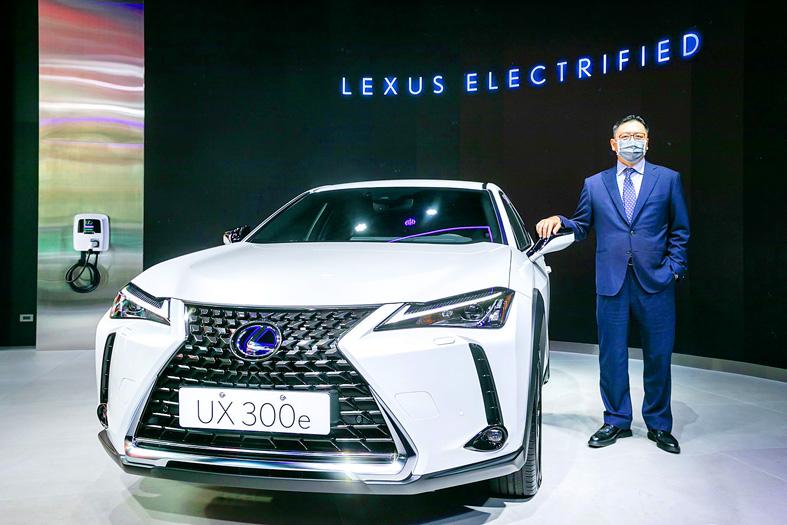New vehicle sales last month rose 5.5 percent from May to 32,631 units, beating market expectations of a flat performance, as moderating local COVID-19 infections gave the market a boost, data released by the nation’s motor vehicle offices showed yesterday.
That represented an annual expansion of 16.8 percent.
As the number of confirmed COVID-19 cases seems to have peaked, consumers were more willing to visit car dealers, said Hotai Motor Co (和泰汽車), which distributes Lexus and Toyota models in Taiwan.

Photo: Amy Yang, Taipei Times
Hotai was expecting new vehicle sales to be little changed from May, given chip supply constraints and key component shortages due to COVID-19 lockdowns in Shanghai.
During the first six months of the year, new vehicle sales contracted 8.6 percent year-on-year to 203,151 units, the data showed.
With more signs indicating a further improvement in the COVID-19 outbreak, Hotai expects auto sales to climb further this month to about 40,000 units, rising 22.58 percent from last month or 5 percent from a year earlier.
As people are gradually returning to normal life and domestic travel picks up, their willingness to buy vehicles is rising, it said.
The start of the summer vacation would further lend support to auto sales, it said.
Hotai said its new vehicle sales last month rose 2.7 percent to 10,208 units, but sales fell about 10 percent from a year earlier.
Sales of Toyota vehicles more than doubled to 9,026 units, offsetting a 9 percent monthly decline in sales of Lexus vehicles primarily due to the chip crunch, it said.
Hotai retained its position as the top seller, with its market share expanding to 31 percent.
Pan German Universal Motors Ltd (汎德永業汽車), which distributes BMW, Porsche and Mini vehicles in Taiwan, ranked second, posting the strongest growth among its peers, with sales soaring 215.9 percent month-on-month to 2,191 units.
Pan German Universal also saw its market share rise to 6.7 percent.
Ford Lio Ho Motor Co (福特六和), a local subsidiary of US-based Ford Motor Co, ranked third, with sales surging 126.2 percent sequentially to 2,131 units last month.
That gave Ford a market share of 6.5 percent.
Following close on its heels was Honda Taiwan Co (台灣本田), with sales of 2,082 units last month, up 117.1 percent from a month earlier, and a market share of 6.4 percent.

POWERING UP: PSUs for AI servers made up about 50% of Delta’s total server PSU revenue during the first three quarters of last year, the company said Power supply and electronic components maker Delta Electronics Inc (台達電) reported record-high revenue of NT$161.61 billion (US$5.11 billion) for last quarter and said it remains positive about this quarter. Last quarter’s figure was up 7.6 percent from the previous quarter and 41.51 percent higher than a year earlier, and largely in line with Yuanta Securities Investment Consulting Co’s (元大投顧) forecast of NT$160 billion. Delta’s annual revenue last year rose 31.76 percent year-on-year to NT$554.89 billion, also a record high for the company. Its strong performance reflected continued demand for high-performance power solutions and advanced liquid-cooling products used in artificial intelligence (AI) data centers,

SIZE MATTERS: TSMC started phasing out 8-inch wafer production last year, while Samsung is more aggressively retiring 8-inch capacity, TrendForce said Chipmakers are expected to raise prices of 8-inch wafers by up to 20 percent this year on concern over supply constraints as major contract chipmakers Taiwan Semiconductor Manufacturing Co (TSMC, 台積電) and Samsung Electronics Co gradually retire less advanced wafer capacity, TrendForce Corp (集邦科技) said yesterday. It is the first significant across-the-board price hike since a global semiconductor correction in 2023, the Taipei-based market researcher said in a report. Global 8-inch wafer capacity slid 0.3 percent year-on-year last year, although 8-inch wafer prices still hovered at relatively stable levels throughout the year, TrendForce said. The downward trend is expected to continue this year,

Vincent Wei led fellow Singaporean farmers around an empty Malaysian plot, laying out plans for a greenhouse and rows of leafy vegetables. What he pitched was not just space for crops, but a lifeline for growers struggling to make ends meet in a city-state with high prices and little vacant land. The future agriculture hub is part of a joint special economic zone launched last year by the two neighbors, expected to cost US$123 million and produce 10,000 tonnes of fresh produce annually. It is attracting Singaporean farmers with promises of cheaper land, labor and energy just over the border.

A proposed billionaires’ tax in California has ignited a political uproar in Silicon Valley, with tech titans threatening to leave the state while California Governor Gavin Newsom of the Democratic Party maneuvers to defeat a levy that he fears would lead to an exodus of wealth. A technology mecca, California has more billionaires than any other US state — a few hundred, by some estimates. About half its personal income tax revenue, a financial backbone in the nearly US$350 billion budget, comes from the top 1 percent of earners. A large healthcare union is attempting to place a proposal before